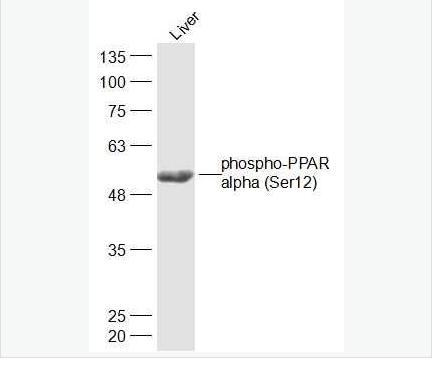Host:Rabbit
Target Protein:phospho-PPAR alpha (Ser12)
IR:Immunogen Range:PL(p-S)PL
Clonality:Polyclonal
Isotype:IgG
Entrez Gene:5465
Swiss Prot:Q07869
Source:KLH conjugated synthesised phosphopeptide derived from human PPAR alpha around the phosphorylation site of ser12:PL(p-S)PL
Purification:affinity purified by Protein A
Storage:0.01M TBS(pH7.4) with 1% BSA, 0.03% Proclin300 and 50% Glycerol. Shipped at 4℃. Store at -20 °C for one year. Avoid repeated freeze/thaw cycles.
Background:Peroxisome proliferators are nongenotoxic carcinogens which are purported to exert their effect on cells through their interaction with members of the nuclear hormone receptor family, termed Peroxisome Proliferator Activated Receptors (PPARs). Nuclear hormone receptors are ligand dependent intracellular proteins that stimulate transcription of specific genes by binding to specific DNA sequences following activation by the appropriate ligand. Studies indicate that PPARs are activated by peroxisome proliferators such as clofibric acid, nafenopin, and WY-14,643, as well as by some fatty acids. It has also been shown that PPARs can induce transcription of acyl coenzyme A oxidase and cytochrome P450 A6 (CYP450 A6) through interaction with specific response elements. PPAR alpha is activated by free fatty acids including linoleic, arachidonic, and oleic acids. Induction of peroxisomes by this mechanism leads to a reduction in blood triglyceride levels. PPAR alpha is expressed mainly in skeletal muscle, heart, liver, and kidney and is thought to regulate many genes involved in the beta-oxidation of fatty acids. Activation of rat liver PPAR alpha has been shown to suppress hepatocyte apoptosis. PPAR alpha, like several other nuclear hormone receptors, heterodimerizes with retinoic X receptor (RXR) alpha to form a transcriptionally competent complex.
Size:50ul
Concentration:1mg/ml
Applications:WB(1:500-2000)
ELISA(1:5000-10000)
IHC-P(1:100-500)
IHC-F(1:100-500)
IF(1:100-500)
Cross Reactive Species:Human
Mouse
Rat
Dog
Pig
Cow
Horse
Guinea Pig
